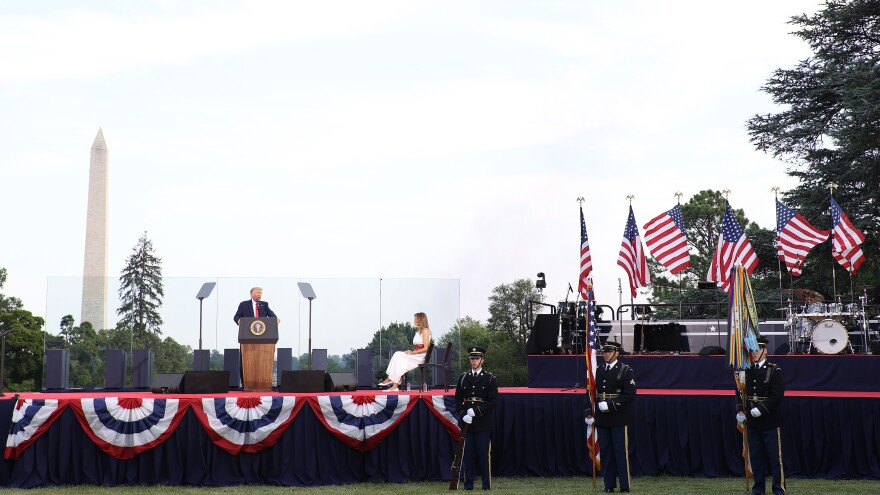President Trump, in a speech Friday at Mount Rushmore that lasted more than 40 minutes, focused on statues and "cancel culture" and accused his political opponents of fascism. But he spared just a few words for the pandemic that has killed 130,000 Americans, thanking "the doctors, nurses and scientists working tirelessly to kill the virus." And that was it.
He gave it a little more attention Saturday night at the White House before a crowd of first responders and their families, touting the number of tests conducted in the United States. "We show cases, 99% of which are harmless," Trump said, adding that the country will have a therapeutic or vaccine solution long before the end of the year. It is unclear what he based that claim on.
Even with coronavirus cases spiking from California to Florida, Trump has largely kept his public focus elsewhere: "law and order," "our heritage," represented by statues that are a target of anti-racism protests, and job gains — even as governors find themselves forced to bring back shutdowns of bars, movie theaters and popular beaches.
This year, when coronavirus cases peaked the first time, the White House task force tackling the pandemic met every day and Trump held near-daily televised briefings. Now the task force meets only sporadically, decisions are made locally and Trump is nearly invisible when it comes to talking to the public about the pandemic.
Last Thursday, for the first time since late April, Trump returned to the White House press briefing room. He wasn't there to talk about surging coronavirus cases but about the latest jobs report, showing millions of people back at work.
"You are going to have a fantastic third quarter. It'll be a third quarter the likes of which nobody has ever seen before, in my opinion," Trump said, bringing his reelection message into the briefing room. "And the good thing is the numbers will be coming out just prior to the election. So the people will be able to see those numbers."
Trump makes no secret of the fact that for him, in this moment, reelection is at center stage. Acknowledging the difficult reality of the pandemic is hard to sell, so even as recently as a few days ago, Trump said the virus was "going to sort of just disappear" — a message that he has repeated since the early days of the pandemic.
On the rare occasions when he does talk about the coronavirus, Trump downplays the negatives. The case spikes, he insists, are just embers. "We have some areas where we're putting out the flames or the fires, and it's working out well," Trump said Thursday.
Four months from the election, Trump is trailing in every major national poll and in numerous swing-state polls. To propel him to victory in November, he is counting on a strong economic rebound and a pitch that the best is yet to come.
"Trump wants to focus on jobs and the economy," said Stephen Moore, who advises the president on economic issues. "I think most people in the president's campaign and the president himself believe that the economy is what he needs to focus on if he's going to beat [presumptive Democratic nominee] Joe Biden."

But public health experts are sounding the alarm, and governors who had previously resisted mask mandates are now imploring everyone to mask up.
"We are heading in the wrong direction, and we are heading there quickly," said Tom Frieden, a former director of the Centers for Disease Control and Prevention who now heads Resolve to Save Lives, an initiative of Vital Strategies, a global health nonprofit. "What we are seeing in the U.S. today is that the virus has the upper hand, and what we're not seeing is systematic regular information given to Americans about what is happening with the virus and where, what is happening with the response and how can we all make it better."
In recent weeks, Trump has left the delivery of public health messages about the virus to others, including Vice President Pence, who brought back coronavirus task force briefings after more than two months without them.
A task force official told NPR that it isn't necessary for the group to meet as frequently as it did in the early days of the pandemic because there are fewer urgent and immediate decisions to be made than when it all began.
On Thursday, Pence met with Florida Gov. Ron DeSantis in Tampa, a hot spot within a hot spot state. The vice president wore a mask as he stepped off Air Force Two and was greeted by a masked DeSantis. Pence's message: "Just know that if all of us do our part, we'll get through this."
Judd Deere, a White House spokesman, took umbrage at the idea that Trump isn't doing enough on the coronavirus pandemic, saying in a statement: "Any suggestion that the President is not working around the clock to protect the health and safety of all Americans, lead the whole-of-government response to this pandemic, including expediting vaccine development, and rebuild our economy is utterly false."
During remarks Thursday about the jobs numbers, Trump did briefly come about as close as he ever has to encouraging people to wear masks. He made news, simply by mentioning masks in a list of best practices.
"That includes face covering, social distance, testing and personal hygiene," Trump said, reading from remarks. "Wash your hands."
And just to make sure everyone noticed, after Trump left without taking questions, Treasury Secretary Steven Mnuchin pointed to the president's remarks, noting: "The president specifically put in his speech encouraging Americans to wear a mask."
The question is, if Trump's supporters don't see him wearing a mask, will they believe others who say that doing so is important to slowing the spread of the virus?
Copyright 2021 NPR. To see more, visit https://www.npr.org.




